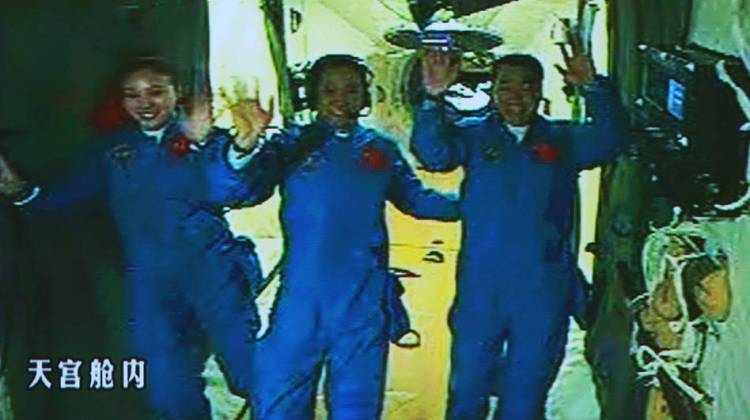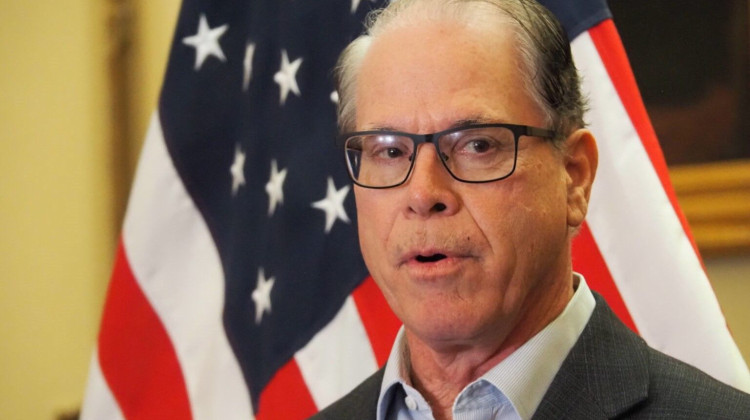It's been just a decade since China became the third nation to put up a manned spacecraft. And China is now leading what some see as a space race among Asian countries: It has worked on a lunar rover, a space station and an unmanned mission to Mars.
I recently visited China's National Space Science Center, which is spearheading much of the research behind these programs. The center aims to be China's answer to NASA's Jet Propulsion Lab and Goddard Space Flight Center.
The center's director, Wu Ji, got his start as an engineer making microwave antennas. He remembers working in Europe in 1986 when he was stunned by the deadly explosion of the space shuttle Challenger, just after takeoff.
"To a young man who was in love with space flight and exploration, it was extremely painful to see this kind of failure," he says. "I felt that exploring space was a massive challenge for which people must sacrifice, and a common cause for mankind."
The center helped to design China's first satellite in 1970. Today, it has a budget of about $80 million, a staff of around 650, and has gone from more commercial projects such as weather satellites to purely scientific research, such as studying dark matter and quantum teleportation.
Two years ago, China put its first Mars probe on a Russian rocket, but the rocket failed and probe was lost. Both the U.S. and India are trying to launch Mars probes this year, while the planets are suitably aligned. After that, there won't be another window of opportunity for a couple of years.
Wu says it's likely to be five to seven years before China makes it to Mars. You can't discover the same things twice, he points out, so China will then pick up where the U.S. and India left off.
"If China launches its own Mars probe, we will certainly choose new scientific goals based on what others have done before," he says. "We will definitely not repeat the scientific objectives of our first Mars probe."
Joan Johnson-Freese, an expert on China's space program's at the U.S. Naval War College in Rhode Island, says India is hoping to beat China to the red planet.
"There's this geostrategic space race in Asia, where China has the clear lead, and India has been more or less desperately searching for what can it be the first to discover or the first to accomplish," Johnson-Freese said.
Wu says China's space programs welcome cooperation with any country. But he's frustrated that two years ago Congress approved a spending bill that bans NASA from using federal funds to cooperate with China.
Opponents of U.S.-China cooperation argue that China's military helps run its space programs, and China really has nothing to teach us about space science. But Johnson-Freese says that even during the Cold War, the U.S. worked with the Soviet Union on some space programs.
"I think this is a counterproductive policy," she says. "If we consider China our competitor, well, there's the expression, 'Keep your enemies close.' So you would want to keep them close to know what they're doing. If we don't consider them our enemy or competitor, why aren't we working with them?"
NASA recently banned Chinese scientists from a meeting about planets outside our solar system, but they changed their mind after U.S. scientists threatened to boycott the conference.
Wu says he is dismayed by the recent changes in the U.S., whose space programs have long been the envy of the world.
"I don't know if your listeners or people living in the U.S. understand these changes," he says. "But as I observe them from the outside, I feel that America is gradually contracting and closing itself off. It's a very strange thing."
Wu says he prefers to cooperate with other countries. If not, China undoubtedly has the ability to go it alone, even if it takes a bit longer.
9(MDEwMDc1MzM3MDEzNDczOTA0MDc1MzViMQ001))
 DONATE
DONATE










 Support WFYI. We can't do it without you.
Support WFYI. We can't do it without you.